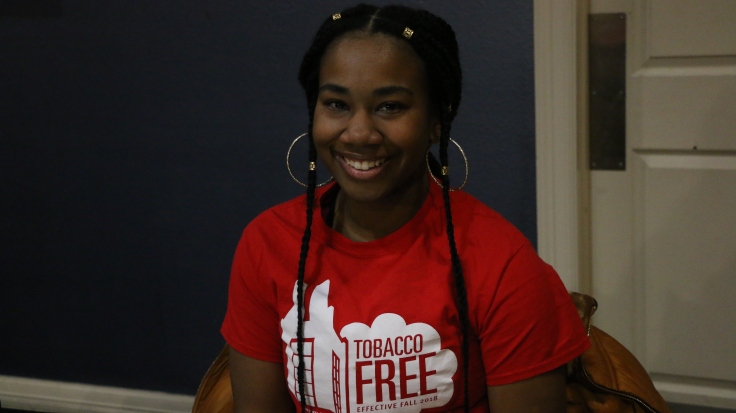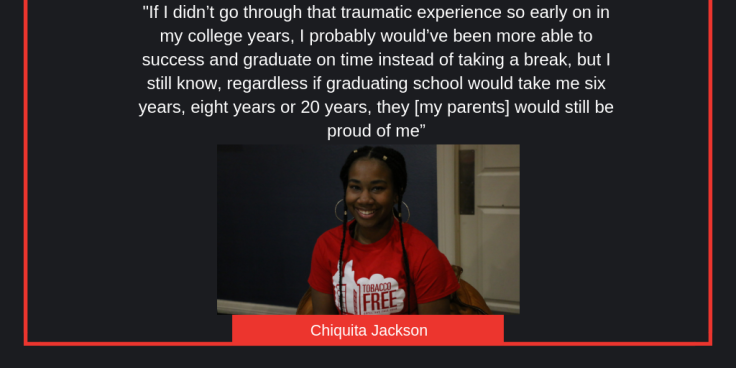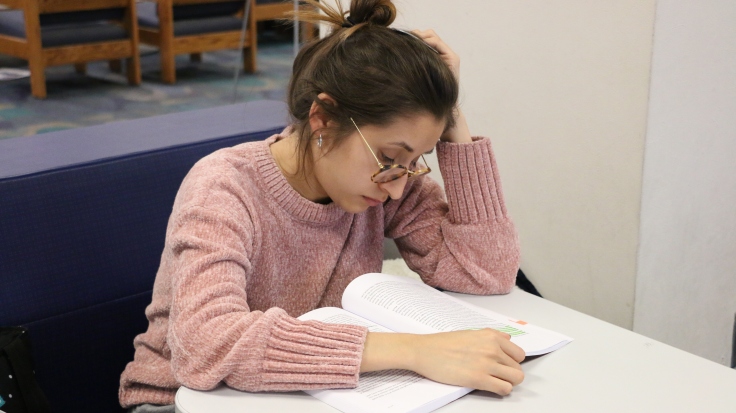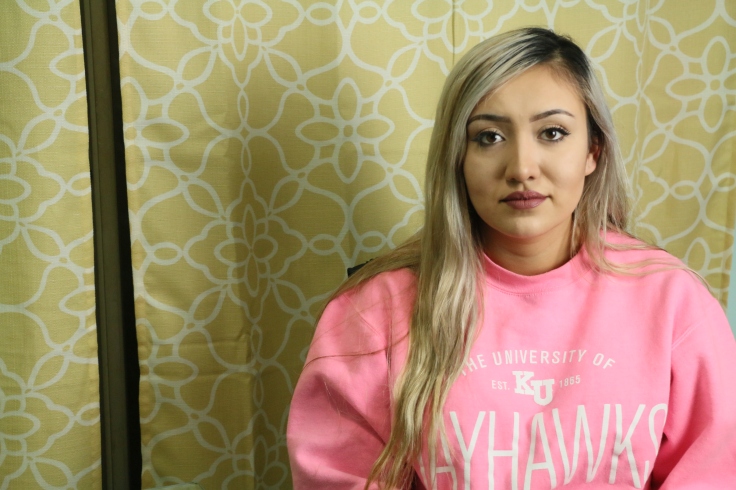
For Chiquita Jackson, a political science major at the University of Kansas, being the first to do something has always motivated her. She was the first in her family to graduate high school and she was the first to attend college. But the route to being the first in her family to graduate from college has been a difficult task for Jackson, who graduates in May. During the first week of her freshman year in 2012, her father died at a party.
“My dad went to a party in Detroit, and he was trying to break up a fight, and five men shot him and kicked him down,” Jackson, a Detroit native, said. My uncle came to my dorm room and told me about it, and I just broke down and cried.”
The following school year, Jackson’s mom was doused in gasoline by her ex-boyfriend.
“I had to make the decision at 19-years-old to pull the plug on my mother, and after my dad passed away, I just shut off,” Jackson said. “I was depressed. I stayed to myself. I really didn’t want to people to see me sweat or cry because I’m from a family where we don’t really show our emotions. At that moment, I felt like I really didn’t have anyone to talk to.”
After her sophomore year, Jackson made the decision to take a year-and-a-half break from school. Now, Jackson, a 24-year-old senior at the University is a part of a slowly declining demographic in college education—-nontraditional students. About 7 million college students are nontraditional students, according a report from the National Center for Education Statistics (NCES) earlier this year, and the overall enrollment for that demographic has declined since 2010 (about 9 million students).
Although the University doesn’t have an exact number on nontraditional student because of missing data, the University estimates that nontraditional students make up about 25 percent of its undergraduate population, according to the Student Involvement and Leadership Center’s website. The University defines nontraditional students as undergraduates who identify with any of the following characteristics:
- are three or more years older than their classmates
- commute 10 or more miles away from home or work to campus
- is married
- has children
- is a veteran
Jackson said receiving no support from the University after her parents’ death highly influenced her decision to take a break from school.
“It was tough for me and the University did not make it easy for me at all,” Jackson said. “I didn’t know what type of resources that were there for me, so I had to take a break,” Jackson said. “I was looking to go back home, but I knew that if I went back home, then I would get distracted. That was just me being strong and knowing what I had to do rather than just giving up on myself.”
Jackson stayed in Lawrence and took online classes at Barton Community College in Leavenworth. She also worked at a debt collection agency in Olathe. She re-enrolled at the University during the 2016-17 school year as a junior.
“It’s still a little frustrating to me because I’m dealing with hardships in terms of constantly having to prove myself to people and me trying to find a way to trust KU again after I feel like they betrayed me,” Jackson said. “It’s still a work in progress.”
Getting a bachelor’s degree is still a work in progress for 32-year-old Chris Conde, who’s starting his first year at the University. Conde, a journalism major, went to Hutchinson Community College and received his associate’s degree last year. Conde said he would’ve received his bachelor’s degree by now if other obstacles didn’t get in the way.
“I lost a semester chasing work at a newspaper, I lost a semester chasing work at a radio station, and I lost a semester when my journalism program was shut down in the spring of 2017,” Conde said.
During his first year at Hutchinson Community College, Conde, who’s from McPherson, Kansas, interned at McPherson Sentinel where he eventually became circulation manager. He worked as a news director for KBBE 96.7 FM radio station after leaving the newspaper, but Conde stepped down from the position to focus more on school.
“I loved the radio station, and I loved what I was doing, but it wasn’t going to help me finish my education in the time frame that I wanted to, and I wanted to be done in 2020,” Conde said.
Conde certainly didn’t know that working in media was the right job for him after graduating high school in 2004. That’s part of the reason why he waited nearly 11 years before enrolling in college. During that time, he spent his time travelling the country, being a night manager at a hotel, being a furniture mover and opening a cleaning business.
“I wouldn’t say that I was looking for myself, but I just wasn’t necessarily interested in education,” Conde said. “The things that I was doing didn’t require a lot of education and I was making good money. But when I got out of high school, I suppose that I wanted to be martyr, maybe. I wanted to fight political injustice, I wanted to be at the forefront of social change, and I didn’t know what that meant. It wasn’t until years later that I found journalism as that thing.”
Since enrolling at the University this semester, Conde said it’s been difficult getting adjusted to a new environment with students who don’t share the same circumstances. Conde currently works with KJHK, and he’s a crime reporter for the Lawrence Journal-World.
“It’s tough being an older student and trying to learn a new city,” Conde said. “It’s a huge gap between community college coursework and university level coursework, and kind of juggling all of that at the same time has been a bit difficult.
Conde credits the Office of First Year Experience for making him feel more comfortable as a nontraditional student.
“First Year has some pretty focused off-campus and nontraditional programs,” Conde said. “That was great during the beginning of the semester. I liked the Common Book discussion, but after Hawk Week, that was the last time I attended some of those events.”
Howard Graham, education programmer for the Office of First Year Experience, said his team has been incorporating nontraditional students into their events for the past three years.
“We’ve put a lot of our efforts into serving off-campus students, and nontraditional students tend to be off-campus students, so, like for Hawk Week, we’ve tried to ramp up our off-campus meeting and hold it in the Union and it runs at the same time as traditional students are meeting with us in their residence halls,” Graham said.
Graham also said that Late Night Breakfast, an event aimed to ease the stress finals week for students, is another program in which they’ve tried to cater to off-campus students.
“We’ve put out through our social media channels that if you’re a student who’s living off campus and don’t have a meal plan, you can come to our office to get a voucher,” Graham said.
Living off campus is another factor that makes Jackson not feel a sense of community at the University. However, since returning in 2016, Jackson was involved with the Black Pre-Law Society on campus and served as the president of Multicultural Student Government. And she still wants to continue that trend of being the first. After graduation, she plans to work toward becoming the first black female Supreme Court justice.
“If I didn’t go through that traumatic experience so early on in my college years, I probably would’ve been more able to success and graduate on time instead of taking a break,” Jackson said.“But I still know, regardless if graduating school would take me six years, eight years or 20 years, they [my parents] would still be proud of me”
SILC houses a resource guide, scholarship information and other services for nontraditional students on its website.
Video: https://www.youtube.com/watch?v=iXm-BpvvonU
Graphic: 



